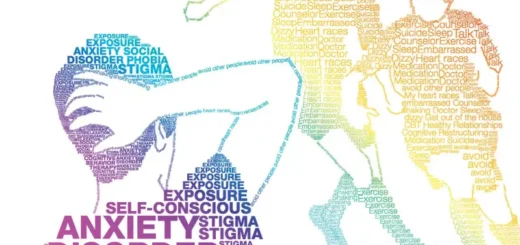Perfectionism and Social Phobia: Insights for Kiwis
Perfectionism can play a significant role in the development of social phobia, particularly among individuals in New Zealand. Many Kiwis may experience social phobia traits, such as intense fear of judgment and avoidance of social situations, which can be exacerbated by a relentless pursuit of perfection. This quest for flawlessness can create an overwhelming pressure to meet both personal and societal expectations, leading to increased anxiety and self-doubt.
Understanding the correlation between perfectionism and social phobia traits is crucial for fostering better mental health awareness in New Zealand. By recognizing these connections, individuals can seek appropriate support and strategies to manage their anxiety. For more insights on the causes of social phobia and its impact on Kiwis, visit Social Phobia NZ.
Understanding Perfectionism and Its Connection to Social Phobia
Perfectionism is often viewed as a positive trait; however, it can lead to various mental health issues, including social phobia. This condition, characterized by an intense fear of social interactions, can be exacerbated by perfectionistic tendencies. Individuals with social phobia traits often fear negative evaluation in social situations, leading them to strive for unattainable standards. This cycle of perfectionism can create a heightened sense of anxiety, making social interactions feel daunting.
In New Zealand, where social expectations can be quite pronounced, the pressure to conform to certain social norms may intensify these feelings. Understanding this connection is crucial for those who experience social phobia traits. For more information on how social phobia manifests and what you can do about it, visit this resource.
Identifying Perfectionism in Everyday Life
Recognizing perfectionism is the first step towards addressing its impact on social phobia. Perfectionists often set unrealistically high standards for themselves, which can lead to feelings of inadequacy and self-criticism. In social contexts, this can manifest as an overwhelming fear of making mistakes or being judged.
In a New Zealand context, cultural factors may contribute to these tendencies. The “tall poppy syndrome” can lead individuals to feel they must constantly achieve and excel to avoid standing out for the wrong reasons. This cultural backdrop can make it even harder for those with social phobia traits to engage socially. By identifying perfectionistic thoughts—such as “I must not embarrass myself” or “I have to be the best”—individuals can begin to challenge these beliefs and reduce anxiety. For more insights, check out this site.
The Psychological Impact of Perfectionism
The psychological ramifications of perfectionism extend beyond mere anxiety; they can lead to more severe mental health issues, including depression and social phobia. Perfectionists often experience a cycle of fear and avoidance: they fear negative evaluation, avoid social situations to escape this fear, and subsequently feel even more anxious about future interactions.
In New Zealand, where social gatherings are common—be it community events, sports, or cultural festivals—individuals with social phobia traits may find themselves increasingly isolated. The psychological impact of this isolation can exacerbate feelings of loneliness and depression. By addressing perfectionism, individuals can work towards healthier self-expectations and reduce the grip of social phobia. For assistance, visit this helpful resource.
Strategies to Combat Perfectionism
To mitigate the effects of perfectionism on social phobia, individuals can adopt several strategies. One effective approach is to practice self-compassion. Instead of harsh self-criticism, individuals can learn to treat themselves with kindness, acknowledging that everyone makes mistakes.
In New Zealand, engaging in mindfulness practices such as yoga or meditation can be beneficial. These practices encourage individuals to stay present rather than fixate on perceived flaws or failures. Additionally, setting realistic goals and celebrating small achievements can help counteract perfectionistic thinking. For more resources on overcoming social phobia traits, explore this website.
The Role of Support Networks
Support networks play a vital role in overcoming perfectionism and social phobia. Friends, family, and professional therapists can provide the encouragement needed to challenge perfectionistic tendencies. In New Zealand, community groups and support services are available for those struggling with mental health issues.
Connecting with others who have similar experiences can be particularly beneficial. Support groups offer a safe space to share feelings and strategies, helping individuals realize they are not alone. This sense of community is crucial for those with social phobia traits who may feel isolated. For more information on support options in New Zealand, visit this resource.
Real-Life Examples of Overcoming Perfectionism
Many individuals in New Zealand have successfully navigated the challenges of perfectionism and social phobia. For instance, someone might share their experience of avoiding social gatherings due to fear of judgment, only to gradually re-engage through small, manageable interactions.
By starting with low-pressure environments, such as casual meet-ups with friends or community events, individuals can build confidence. Sharing their stories can also empower others facing similar challenges, fostering a sense of solidarity. For more inspiring stories and strategies, check out this site.
Seeking Professional Help
When perfectionism and social phobia become overwhelming, seeking professional help is crucial. Therapists and counselors in New Zealand can provide tailored strategies to help individuals manage their anxiety and perfectionistic thoughts. Cognitive-behavioral therapy (CBT) is particularly effective in addressing these issues, as it helps individuals reframe negative thought patterns.
Additionally, various mental health organizations in New Zealand offer resources and support for those struggling with social phobia traits. Engaging with professionals can provide the necessary tools to break the cycle of perfectionism and anxiety, allowing individuals to thrive in social situations. For more guidance, consider visiting this helpful resource.
FAQs
What is social phobia?
Social phobia, also known as social anxiety disorder, is characterized by an intense fear of social situations where individuals may be judged or scrutinized by others. This condition can lead to avoidance behaviors and significant distress in daily life.
How does perfectionism relate to social phobia?
Perfectionism often drives individuals to set unrealistically high standards for themselves, which can exacerbate feelings of inadequacy and fear of judgment. Those with social phobia may become overly focused on their performance in social situations, leading to increased anxiety and avoidance.
What are some common traits of social phobia?
Common traits of social phobia include excessive self-consciousness, fear of embarrassment, avoidance of social gatherings, and physical symptoms such as sweating or trembling in social settings. Perfectionists may experience these traits more acutely due to their heightened sensitivity to perceived failures.
Can perfectionism be a risk factor for developing social phobia?
Yes, perfectionism can be a significant risk factor for developing social phobia. The pressure to meet high standards can lead to increased anxiety about making mistakes in social interactions, contributing to a cycle of fear and avoidance.
How can individuals in New Zealand address perfectionism and social phobia?
Individuals can seek support through therapy, such as cognitive-behavioral therapy (CBT), which helps reframe perfectionistic thoughts and develop healthier social skills. Additionally, support groups and community resources in New Zealand can provide valuable encouragement and strategies for managing these challenges.
Are there specific strategies to cope with social phobia linked to perfectionism?
Some effective strategies include gradually exposing oneself to social situations, challenging negative thoughts about performance, and practicing self-compassion. Mindfulness techniques can also help individuals stay present, reducing the impact of perfectionistic fears.
Where can I find more resources about perfectionism and social phobia in New Zealand?
There are various resources available in New Zealand, including mental health organizations, online support groups, and local therapists specializing in anxiety disorders. Websites like the New Zealand Mental Health Foundation and Anxiety NZ provide valuable information and support for those struggling with social phobia and perfectionism.
References
- Social Phobia New Zealand – A comprehensive resource providing information and support for individuals experiencing social anxiety and perfectionism.
- The Perfectionism and Social Anxiety Connection – An article discussing the link between perfectionism and social anxiety, highlighting how these two issues can exacerbate each other.
- Perfectionism and Social Anxiety Disorder: A Review – A scholarly review that examines the relationship between perfectionism and social anxiety disorder, providing insights into treatment approaches.
- The Perils of Perfectionism – An article from the American Psychological Association exploring the negative consequences of perfectionism, including its role in mental health issues like social phobia.
- The Link Between Perfectionism and Anxiety – This article outlines how perfectionism can lead to increased anxiety and social phobia, providing practical advice for managing these issues.




